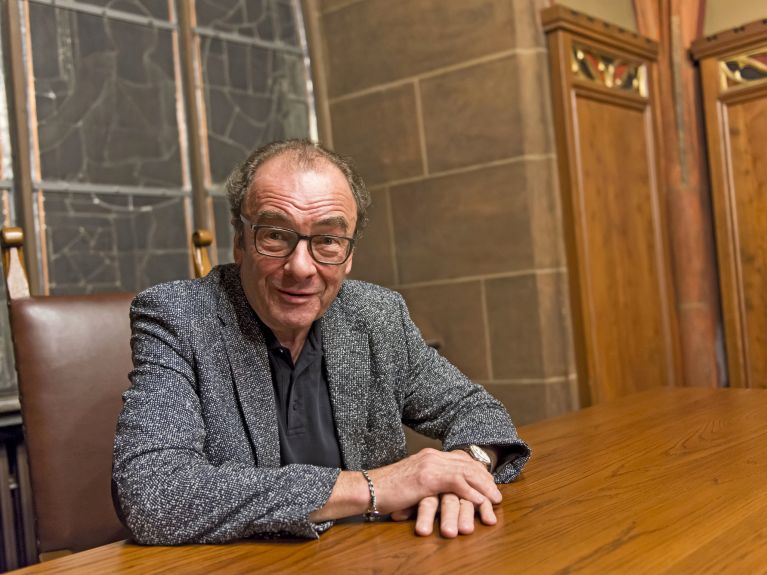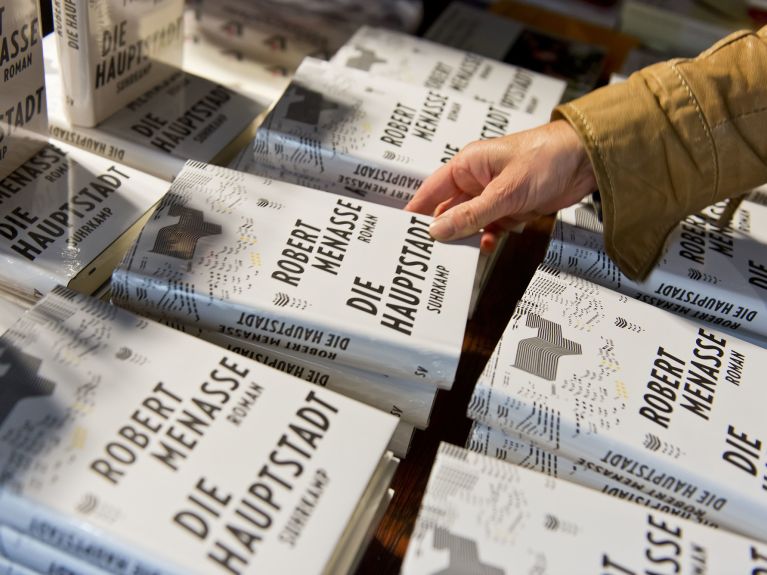“I am allowed to dream”
Not a bureaucratic monster but a unique opportunity: what fascinates bestselling author Robert Menasse about the EU and why he would enlarge it.

Mr Menasse, in many of your essays you have expressed your concern about Europe and the project for peace, security and openness to the world. Why are Europe and the European Union (EU) in such a plight?
Over the course of 60 years, the European unification project has taken us a very long way in many small steps. Since roughly 2010, however, there is evidence of an unproductive contradiction that can no longer be kept in balance by compromise: the contradiction between post-national development – the conscious shaping of which was the EU’s objective, after all – and the growing resistance of the nation states, the renationalisation of the politics of the member states and of the consciousness of increasing numbers of voters. Joint solutions to the major challenges of the present day and of the future thus cannot yet work, while national solutions no longer work. We have seen an accumulation of crises since 2010 – all are attributable to this contradiction.
Unfortunately, we have institutionally cemented this problem into the EU: the Treaty of Lisbon strengthened the power of the European Council, the organisation that defends national interests and egoisms. Further necessary steps towards communitarisation rebound off the blockade that is this strengthened council. This is intolerable as it means we will have to suffer globalisation rather than shape it.
The EU appears to be something anonymous. That is crazy given that the European idea of unification is in fact very concrete whereas the idea of national identity is something highly abstract.
Your novel “Die Hauptstadt” has won the German Book Prize. Although the subject of the EU appears unwieldy to many people, the novel is impressive in the way it gradually sucks the reader in. How does this happen?
Most people see the EU merely as something very abstract, something erratic that has no face, and not as something that one can actually imagine in any sensory form. Everything that comes from Brussels is always viewed in relation to national politics. Yet national politics, national government and opposition have faces and names that one knows, and stories that are perpetuated on a daily basis by the media. By contrast, “the EU” and “Brussels” appear to be something anonymous, something virtually akin to foreign rule, with civil servants sitting in their fortresses in the capital city of another country. This is of course crazy given that the European idea of unification is in fact very concrete whereas the idea of national identity and of national interests is something highly abstract. When this became clear to me, I knew that I had to go to Brussels! I had to go and see it for myself!

“The EU” after all is human-made – and it must be possible to explain everything that is made by humans. That was the goal: to give the EU a face. Obviously I could not explain everything that I learnt and saw during my years in Brussels. But perhaps this will give rise to a cycle: “La tragicomédie européenne”, the European tragicomedy. And what is the point for readers outside the EU? Well what is the point for European readers of literature that is written outside Europe? We get to know one another. The entire human comedy.
In “Die Hauptstadt” you depict a Brussels of careerists, power-hungry people and individual interests. What does the European Union need if it is to have a viable future?
First of all, it needs a strong European Commission president once again. Only when the power of the European Council is reduced can Europe develop and fulfil the promises that were made to us.
What is Europe for you?
The EU is doubly fascinating: it is the first political system that was not created as a result of the dynamism of productive forces and evolved, but that was founded as a lesson learnt from historical experiences. Even in terms of its approach it is more enlightened than any form of blind rule in history. At the same time, the EU is the only political project worldwide that already constitutes a logical systemic answer to the future that is taking place, namely globalisation. Globalisation after all means nothing other than the destruction of all national boundaries and sovereign spheres of national activity. This is where the EU has or should have the greatest expertise, as the European project has been developing post-national politics in small steps for more than 60 years. And in this context it is constantly claimed, including by those responsible for European policy, that the EU needs a narrative! When I hear this I cannot believe my ears. The EU already has a narrative. How often have I wanted to scream “Then just tell the narrative at last!” What is all that rubbish about a “narrative” that still needs to be invented?
Nationalism reduced Europe to rubble and destroyed European civilisation. Many millions of people became victims of the conflicts and wars between rival nation states. The founding fathers of the European unification project drew a lesson from this: namely that we must overcome nationalism. This was the objective – we would build the first post-national continent. And that is surely a fascinating narrative, isn’t it?
Unlike a politician engaged in realpolitik or a pragmatist, I am allowed to and do indeed dream, knowing perfectly well that history has shown us time and time again that dreamers were proved right in the long run.
In the EU we have today a political system in progress that could do exactly what it is supposed to: act, design and create political order where nation states no longer can. We must not lose sight of the fact that Europe in this respect should actually be the global avant-garde. And in the longer term I see no limits to this. Unlike a politician engaged in realpolitik or a pragmatist, I am allowed to and do indeed dream, knowing perfectly well that history has shown us time and time again that dreamers were proved right in the long run.
And do you see any geographical limits?
Israel should of course become a member of the EU. Israel is the product of a problem that was produced in Europe. It should be brought back to Europe. It is also possible that entirely new opportunities would be opened up for the peace process in the Middle East under the auspices of the European peace project. And at least the simple fact that Israel would be able to count on the support of 28 European states would contribute to stabilising the region. And naturally the countries of North Africa should belong to the EU. This historically shared cultural area – “mare nostrum” – must be reconstructed. This would also be the logical way to bring peace to the Mediterranean, currently a death zone.
I will stop fantasising here, as this will not be happening during my lifetime. However, the EU is the first political project that has made the recognition of human rights its constitutional basis. Anyone who does not acknowledge this and does not defend this against nationalists is blind both to history and to the future.
Interview: Sarah Kanning
